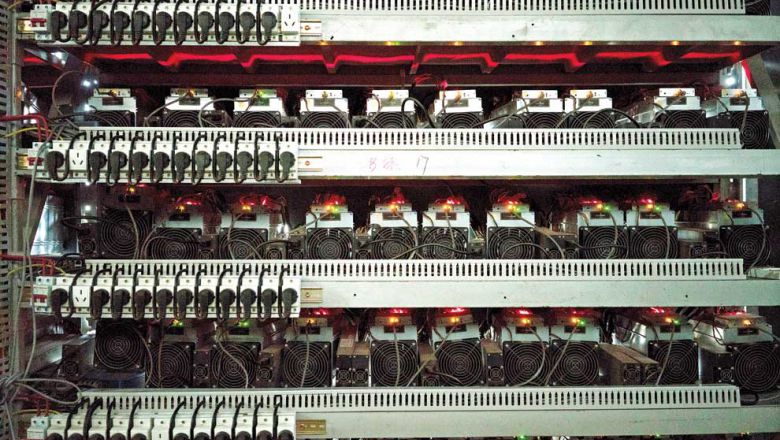Uncertainty over future of cryptocurrencies in Cambodia
On Wednesday, Deputy Prime Minister Men Sam An stood in front of a conference hall in Phnom Penh to give the opening remarks for the launch of a new cryptocurrency, Entapay, encouraging the company to follow relevant laws in Cambodia.
But crypto enthusiasts in the Kingdom say that’s easier said than done. Cryptocurrency exists in a legal “grey area”, according to several entrepreneurs pursuing crypto projects in the Kingdom, with the government rejecting the currencies themselves while embracing their underlying technology.
In Mean is the lead developer of the Khmer Crypto Foundation, and has also created his own cryptocurrency called KHCoin. While Mean admitted to feeling on-edge about operating in an atmosphere of regulatory uncertainty, he said he understood the hesitation on the part of the National Bank of Cambodia (NBC) to engage with cryptocurrency. The new technology is often plagued by scams, wild fluctuations in value and under-regulation.
When Mean created KHCoin, he originally offered it for free to stay on the right side of the law. Then, when he tried to monetise it, he got slapped down by regulators.
“I wanted to bring value to my coin, but when I started my payment system, the national bank said, ‘Any crypto transaction is illegal’,” Mean said, referring to an announcement from the NBC in December banning “all banks and microfinance institutions from trading, buying, selling and advertising cryptocurrencies”.
That announcement led some banks to prevent customers from using their own personal bank accounts to buy or sell cryptocurrency, which made it difficult to trade in cryptocurrencies without specifically outlawing people from owning them.
But prior to its December announcement, the NBC had launched its own initiative to explore the use of the underlying technology that cryptocurrency relies on, a concept known as blockchains. The NBC signed an agreement with a Japanese firm in April to develop a blockchain-based project for its own internal use, which would track interbank lending and transactions.
Blockchain was developed in 2009 to operate as a public ledger for the original cryptocurrency, bitcoin. The technology operates by recording a series of new transactions, called “blocks”, that reference previous blocks, forming a cryptographically secure list of recorded transactions that are linked together.
“At its core, the blockchain is just a database . . . We’ve discovered a way for the public to change this database without corrupting any of the previous entries within it, so it’s impossible to fake a transaction,” explained Steve Miller, founder of Cambodia-based blockchain group CryptoAsia.
According to Miller, a “private blockchain” project like the one at the NBC is just a database lacking a verification process. And that verification process – the backbone of any blockchain project – is where cryptocurrencies become necessary, according to Miller.
The verification of blockchain records is called “mining”. For example, before Miller can transact with a second person using a blockchain ledger, a “miner” must first run a process on their computer to verify the public ledger, ensuring that Miller’s transaction matches what the public ledger says it should be.
After completing this energy- and computing-intensive process, the miner then verifies the transaction and is rewarded for their effort – usually with a small amount of cryptocurrency.
“Cryptocurrencies are necessary for public blockchains to function properly because they provide the incentive for anonymous participants to secure the system,” Miller said.
Thus, while the NBC has not explicitly banned blockchain technology in Cambodia, its restrictions on cryptocurrencies have impaired entrepreneurs’ ability to pursue projects based on the underlying tech.
Rithy Thul, a Cambodian entrepreneur whose latest blockchain project aims to facilitate overseas remittance payments in the Kingdom, said that the future of cryptocurrency and blockchain technology in Cambodia remains up in the air.
“I think it is a good sign that the [NBC] is trying to use blockchain technology, because it will be more likely to endorse future blockchain projects,” he said. “But the use of cryptocurrencies is still in a grey area.”
That hasn’t stopped some companies from pushing forward. Pierre-Marie Riviere is the network lead of DApact, a company that seeks to use blockchain technology to connect lenders to borrowers without the need for an intermediary, such as a microfinance institution.
The company hopes that by using blockchain and cryptocurrency, they could replace the traditional role of a microfinance institution, drastically reducing interest rates for borrowers in developing nations.
DApact has already launched a $10,000 pilot project in Cambodia according to their website, and is now seeking investors to expand their program.
It’s an ambitious project, but Riviere points to other places where blockchain technology is already being deployed.
“There are many industries that could be disrupted,” he said, noting that Brazil has promised to use blockchain to regulate its voting system, while Japan has begun utilising the tech to monitor land management.
Mean, who is still hoping to monetise his KHCoin project, said he was hoping the central bank would realise the potential of blockchain with its own internal project and take a more liberal stance on cryptocurrencies in the future.
“When the NBC changes its mind, I will be ready,” he said.
Source: http://www.phnompenhpost.com/business/uncertainty-over-future-cryptocurrencies-cambodia


 English
English




